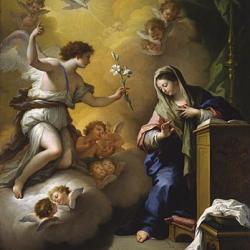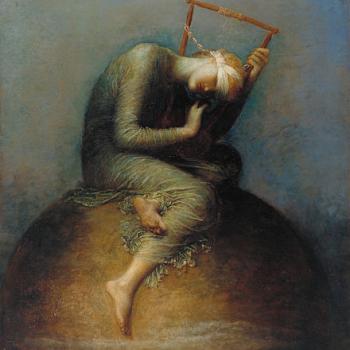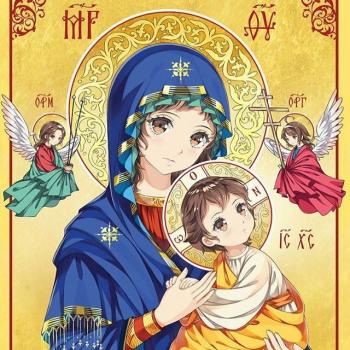Here is another great guest post from Deacon Joshua Klickman. It was originally a homily for the feast of Christ the King. But seeing it’s Advent and I procrastinated looking at, I tweaked it to a Advent Homily….Mark
1. Advent is the time we get ready to celebrate the birth of Our Lord Jesus Christ, King of the Universe. During Advent and Christmas it is good to be reminded that the infant Jesus Christ has received all power, divinity, wisdom and strength and honor. He is the King of the Universe and we are his brothers and sisters. This makes us royalty too, so when I meditate on the meaning of this season, I hear God say to me, “you have been chosen as a brother of the King of the universe, act like it.”
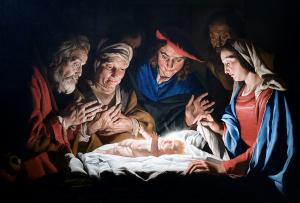
2. The scriptures tell us what it means to act like the King of the Universe is your brother. All who profess Christ as King must treat every human being as another Christ, because all humans are made in the image and likeness of God. Since we are the hands, feet, and face of Jesus, and we must treat everyone as royalty because, as we hear in the Gospel, Christ himself is present in the people deemed “unwanted” by our society.
3. If we do not choose to be united with Christ in the hungry, the homeless, the migrant, the orphan, the imprisoned, and the unborn in this life, we will NOT be united with Christ in the next. Our selfish life on earth will prepare us to be alone for eternity. Jesus does not mince words when he says, “’Amen, I say to you, what you did not do for one of these least ones, you did not do for me.…Depart from me, ye cursed, into everlasting fire, which was prepared for the devil and his angels.”

4. We are reminded that Jesus is the King and that the laws of the Universe lead us to true happiness. This relates back to feast of Christ the King celebrated just before Advent. It was instituted in 1925 by Pope Pius XI. This Solemnity sought to combat the errors of modernity and the flawed ideas that hide behind the words “Religious Freedom,” or, “the separation of Church and State.” Now, properly understood these concepts are good. Freedom is necessary for true happiness, but people will sneak lies and propaganda into these terms, so let me briefly clarify what the Church teaches about the relationship between religion and state.
5. To begin, I want to tell you some of the false ideas that I learned growing up. I learned that the church opposed the separation of church and state. I was told that the church had a long history of enforcing senseless religious laws on people, and that the church killed scientists. I was taught that THIS was why we needed a separation of church and state. I was told that religion was fine for personal therapeutic uses, but that it had not place in public life.

6. All of these statements are strawmen at best and the phrases “separation of church and state” and “religious freedom” are often invoked as propaganda and mixed with disinformation in order to marginalize Christian influence on public life. Ironically, this is the exact opposite OF religious freedom. Indeed, prohibiting the free practice of religion violates the principles of the US Constitution. So, let me provide quick survey of the history of the relationship that states and religions have had.
7. In the time of Jesus, in many parts of the pagan world, there was no separation of religion and state. Although there was some freedom of religion, as evidenced by Jewish communities throughout the world, the ruler was often considered some type of god and the people had to pay homage and worship the human leaders as if they were gods. Many Jews and Christians were killed for refusing to worship civic leaders.
8. In the fourth Century, when it became legal to be a Christian, there was an increased separation of church and state. The civil authorities had jurisdiction over civil and criminal things, and the Church had jurisdiction over religious things. This was also part of how canon law developed. Now, the degree of separation varied according to time and place. There were still many persecutions and, in many places, bishops were selected by the state leaders, not the Church.
![]()
9. One period of problematic unity of religion and state was during the Protestant Reformation. Secular authorities sought to remove power from clerics and promoted the idea that the ruler of the land was the final authority for interpreting Scripture. Thus, King Henry the eighth declared himself as the head of the Church of England. The idea was that priests and bishops were specialists who had a vested interest in protecting their own institution, so it was best to leave religious decrees to the secular leaders. They proof-texted this idea by invoking the memory of King David and saying that kings and elected officials were obviously chosen by God, flaws and all. This served as a tipping point for some of the enlightenment thinkers who sought create a larger separation between Church and State, which brings us to the United States where it was written into the Constitution as, “Congress shall make no law respecting an establishment of religion, or prohibiting the free exercise thereof…”
10. The founding fathers of the United States knew that religious liberty is not granted by the state, but it is a natural right, and so the church should not have to depend on the government in order to do their work. When it came time to select the first US bishop, the Vatican recommend Father John Carroll to the US Congress, who replied that they did not care who was selected. They said that the matter was “purely spiritual…outside of the jurisdiction and powers of Congress who have no authority to permit or refuse it…” I submit this is a healthy separation of church and state, and for a long time the United States was the only place in the world where the Church could set up dioceses, parishes, charities, and schools without having to get any formal approval from the state.
11. However, the statement “keep your religious beliefs out of public life” has been used to suppress the moral laws that lead to true happiness. I think that the most salient vignette to demonstrate this comes from the story of Mr. Wilberforce and the abolition of slavery.
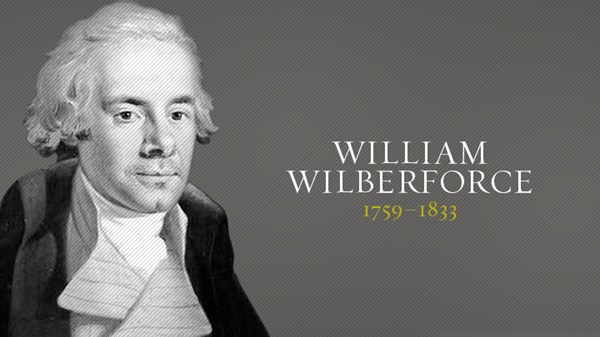
12. Around the same time that the United States was being formed, there was a British parliamentarian named William Wilberforce. He was a rich young man who lived a wild and immoral life. William had a conversion experience, and this led to him change his sinful habits. He also considered leaving his job as a legislator, because at the time any religious enthusiasm was considered uncivilized. It was said that you couldn’t be a good Christian and a good public official. People resistant to changing their immoral practices would ridicule public leaders who brought their faith into political life. Wilberforce was troubled by the acceptance of vice, the poor treatment of women and children, and the slave trade. William wanted to take these issues head on, but he was told to keep his religion out of politics.
13. So he sought the counsel of some of his friends, including John Newton (the writer of the hymn “Amazing Grace”), who told William, “God has brought you into public life and has a purpose for you.”
14. After this affirmation from his friends, William lived his faith boldly and publicly. Inspired by the Gospel, he gave away a quarter of his income to the poor and fought diligently for the rights of those on the margins, including chimney sweeps, single mothers, and orphans. William spent the last half of his life working to abolish slavery and many historians have stated that without the leadership of Mr. Wilberforce, the abolition of slavery would not have been achieved.
15. This is precisely what Pius XI had in mind when he established this feast. Since the majority of men have thrust Jesus Christ and his holy law out of their lives, there are manifold evils in the world. Men say that Jesus has no place in private affairs or in politics, but the Church says that until individuals and states submit to the rule of our Savior, there will never be a lasting peace among nations. Jesus is the King and author of all truth, so these truths must be obeyed by all mankind.

16. Dr David Reardon, a biomedical ethicist who has dedicated his life to post abortion healing says, “God’s moral law is not given to us to enslave us, or even to take the fun out of life. It is given to us as a path toward true happiness…any advantage gained through violation of the moral law is always temporary; it will invariably be supplanted by alienation and suffering.”
17. In the Preface for the Eucharistic prayer for the feast of Christ the king, we are reminded that God the Father anointed his Only Begotten Son as eternal Priest and King of all creation. Jesus offered himself on the altar of the Cross in order to bring us peace. He accomplished our redemption and made all created things subject to his rule so that he might present to the Father an eternal and universal kingdom, a kingdom of truth and life, a kingdom of holiness and grace, a kingdom of justice, love and peace.

18. Therefore, we must act like brothers and sisters of the King of the Universe, and we start by seeking our own individual holiness. We have no power to do this on our own. We are all sinners in need of the healing graces that only come from Jesus, and the most efficacious way to transform our lives is to participate in the sacraments.
19. Filled with the love that comes from God, we go out and encounter Jesus in our brothers and sisters, and we call this outpouring of love “charity.” Then, we look for the conditions that cause our brothers and sisters to need charity and change what we can. We must seek justice by transforming the laws of the state to be in accord with the laws of God. It would not have been fully Christian for William Wilberforce to minister to slaves with charity, providing them food and comfort items, while ignoring the unjust and anti-Christian laws that treated some groups of people as objects to be exploited. When we seek justice, we are acknowledging the kingship of Christ.
20. And so today we go out on our mission to make disciples of all nations with the reminder that we are brothers and sisters of the King of the Universe, we must to act like it. This means that we will allow Jesus to transform and strengthen us through the Sacraments and a life of prayer. We will see the face of Jesus in those that we meet, as St John the Evangelist says, “…if any one has the world’s goods and sees his brother in need, yet closes his heart against him, how can the love of God remain in him?” And we seek justice, as St Ambrose said in the 4th Century, “When you give to the poor man, you are not making a gift of what is yours, but you are giving back to him what is his. You have been appropriating things that are meant to be for the common use of everyone. The earth belongs to everyone, not to the rich.”
21. So, let us go out and love Jesus without compartmentalization. Let us be transformed inwardly by the love of Christ during this Advent season and act like his brothers and sisters by boldly proclaiming that Jesus Christ is King.




